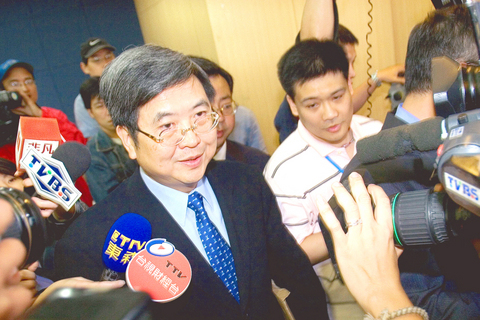Suspended Financial Supervisory Commission (FSC) Chairman Kong Jaw-sheng (
"I have been suspended and I will leave ... it is impossible for me to return to the post," Kong told reporters yesterday.
"I respect the Cabinet's decision. But I came in [to the position of FSC chairman] with a clean reputation and I hope to leave with one," Kong said.

PHOTO: AP
He repeated these sentiments several times during the press conference, but shied away from giving a date for his resignation.
Stressing that he held himself to high moral standards and had a clear conscience, Kong said: "I am in this situation today because I got in the way of certain interest groups as the head of an independent financial supervisor, whose duties always involve interests worth tens of billions of dollars."
The official, who said he was politically naive, declined to identify the "interest groups" to which he referred.
Looking solemn but tired, Kong made the remarks at a media briefing yesterday after three days of silence following the Cabinet's unexpected decision to suspend him late last Friday.
Kong was questioned for about 13 hours and released on bail of NT$500,000 (US$15,800) last Thursday by the Taipei District Prosecutors Office, which is investigating claims he conducted public business for private gain during his chairmanship at the state-run Taiwan Sugar Corp (Taisugar,
He was accused of awarding Taisugar's upscale cosmetics franchise to a certain company without going through the regulatory procurement process as well as bypassing government procurement requirements and hiring his sister-in-law as a paid consultant to the company's coffee shop business.
Kong was nominated to chair the FSC by the premier at the time, Yu Shyi-kun, and approved by President Chen Shui-bian (
As the position of FSC chairman has a four-year tenure, and the nation's highest financial regulator is supposed to be immune to political influence in order to safeguard the independent status of financial policy-making, some have questioned whether it is possible for Kong to be forcibly removed.
The confrontation between Kong and the Cabinet appeared to escalate yesterday as the government said it stood by its decision on Kong's suspension.
Premier Su Tseng-chang (
The ruling was made with prudence and legitimacy, and would not be changed, Cheng said, adding that the Cabinet expected Kong to make a "wise decision" as soon as possible.
Denying the allegations against him, Kong said it did not make sense that he would give up a well-paid job at an international investment banking business to make relatively small profits through corruption as a public servant on a much smaller salary.
Kong spent 20 years in the financial industry before entering the public sector, serving as a national manager for Credit Suisse First Boston and president of Lehman Brothers Holding Inc's Taiwan unit.
In light of recent developments, legislators are planning to amend regulations and set up a mechanism to dismiss corrupt officials who are in positions that enjoy political immunity.
Another such position of safety is that of governor of the central bank.

Sweeping policy changes under US Secretary of Health and Human Services Robert F. Kennedy Jr are having a chilling effect on vaccine makers as anti-vaccine rhetoric has turned into concrete changes in inoculation schedules and recommendations, investors and executives said. The administration of US President Donald Trump has in the past year upended vaccine recommendations, with the country last month ending its longstanding guidance that all children receive inoculations against flu, hepatitis A and other diseases. The unprecedented changes have led to diminished vaccine usage, hurt the investment case for some biotechs, and created a drag that would likely dent revenues and

Macronix International Co (旺宏), the world’s biggest NOR flash memory supplier, yesterday said it would spend NT$22 billion (US$699.1 million) on capacity expansion this year to increase its production of mid-to-low-density memory chips as the world’s major memorychip suppliers are phasing out the market. The company said its planned capital expenditures are about 11 times higher than the NT$1.8 billion it spent on new facilities and equipment last year. A majority of this year’s outlay would be allocated to step up capacity of multi-level cell (MLC) NAND flash memory chips, which are used in embedded multimedia cards (eMMC), a managed

CULPRITS: Factors that affected the slip included falling global crude oil prices, wait-and-see consumer attitudes due to US tariffs and a different Lunar New Year holiday schedule Taiwan’s retail sales ended a nine-year growth streak last year, slipping 0.2 percent from a year earlier as uncertainty over US tariff policies affected demand for durable goods, data released on Friday by the Ministry of Economic Affairs showed. Last year’s retail sales totaled NT$4.84 trillion (US$153.27 billion), down about NT$9.5 billion, or 0.2 percent, from 2024. Despite the decline, the figure was still the second-highest annual sales total on record. Ministry statistics department deputy head Chen Yu-fang (陳玉芳) said sales of cars, motorcycles and related products, which accounted for 17.4 percent of total retail rales last year, fell NT$68.1 billion, or

In the wake of strong global demand for AI applications, Taiwan’s export-oriented economy accelerated with the composite index of economic indicators flashing the first “red” light in December for one year, indicating the economy is in booming mode, the National Development Council (NDC) said yesterday. Moreover, the index of leading indicators, which gauges the potential state of the economy over the next six months, also moved higher in December amid growing optimism over the outlook, the NDC said. In December, the index of economic indicators rose one point from a month earlier to 38, at the lower end of the “red” light.